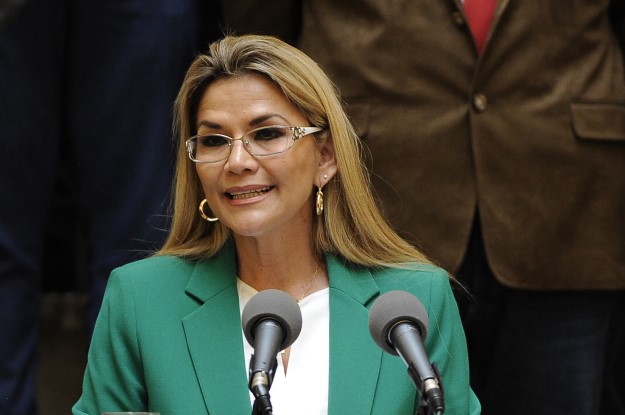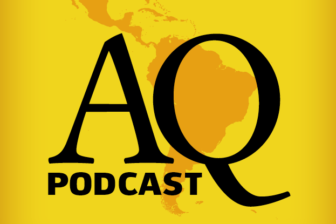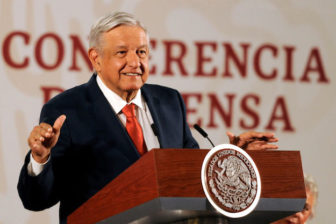Bolivia has been trying to elect a new president since last October, when the voting ended in protests, violence, President Evo Morales’ resignation and the ascent of an interim government nobody had voted for. Since then, the devastating COVID-19 pandemic has compounded the political crisis, delaying the do-over vote and complicating the dynamics of the campaign.
“I think the word of this crisis right now is uncertainty,” Rodrigo Riaza Pérez, an analyst at the Economist Intelligence Unit, told AQ.
With so much unknown, four questions loom over the presidential race – and their answers could shape Bolivia’s political future.
- When will the election actually happen?
The scheduled do-over vote for May 3 was delayed because of the coronavirus, and the debate over when to go back to the polls has become a flashpoint for Bolivia’s fraught political divisions.
Congress, where Morales’ Movement Towards Socialism (MAS) party has a majority, voted to hold elections by August 2. Interim President Jeanine Áñez, herself a candidate, criticized the move as reckless, and Morales himself later tweeted that MAS would be open to extend the deadline to ensure public health.
On June 2, Bolivia’s electoral body set the election date for September 6 but it’s still uncertain whether it will definitely happen then. Congress must now approve the date. After the tribunal set the date, Áñez’s party said it wasn’t part of the electoral body’s accord with other parties. The coalition fielding businessman and conservative candidate Fernando Camacho also rejected the decision. Áñez’s critics say she will – and already is – try to use the pandemic to extend or cement her rule. Experts AQ spoke with believe Áñez could still manage to have the election postponed, citing – legitimately or not – the public health crisis.
- Will scandals sink Áñez?
Áñez enjoyed something of a coronavirus bump after the pandemic sidelined her competitors from campaigning and gave her the opportunity to resolutely issue a lockdown and send out payments to economically vulnerable Bolivians. An IPSOS poll in early May found that 69% of respondents thought her pandemic response was good or very good.
But Áñez hit turbulence in mid May after it was revealed the government paid grossly inflated prices for 170 ventilators. On May 20, the health minister was arrested and subsequently fired. Áñez has promised firm justice, but the scandal threatens to derail her candidacy.
“One of the main drivers against the Morales government was this idea that it was corrupt and becoming increasingly authoritarian,” Riaza told AQ. “Anything that reminds voters of that has the potential to hurt her popularity.”
It may already have. Another IPSOS poll conducted as news of the ventilators case broke put Áñez’s approval at 46%, a stark drop from just weeks prior.
There were at least 13 corruption cases involving Áñe’z’s government in its first six months, according to La Razon. And the scandals don’t end there. Áñez had to fire her mining minister Fernando Vásquez on May 30 after he made racist comments on the radio, saying he couldn’t have ties to the largely indigenous MAS party because of his green eyes and white skin. “I don’t have the prerequisites,” he said.
“To hear something like that coming from an official, that’s serious,” Evelyn Callapino Guarachi, a political scientist at Domingo Savio Private University, told AQ. “These scandals are totally changing the dynamic ahead of the election.”
It’s possible the scandals will blow over, or at least be seen by Áñez’s sympathizers as being politicized.
“The political polarization that existed before the crisis is still going to be the main driver of the political climate, in my opinion, even if there are corruption charges,” said Riaza.
- How bad will the pandemic get?
Despite a strict national lockdown that started on March 22, Bolivia’s coronavirus curve is still on the ascent. The country set a record daily death toll on Monday, June 1 – the same day it started relaxing its quarantine in some cities. It broke the record the next day when it reported 33 deaths on June 2.
Bolivia has tested less than 3 per 1,000 people. Only Mexico and Brazil have worse rates, according to Our World in Data. The departments of Beni and Santa Cruz, Bolivia’s economic engine, have been hit particularly hard. Many observers are pessimistic about the government’s ability to flatten the curve and mitigate the economic damage.
“I don’t see a roadmap for ending the quarantine or for gaining control of the pandemic,” Juan Antonio Morales, an economics professor and former president of Bolivia’s central bank, told AQ.
If the infection curve doesn’t flatten soon, that could hurt Áñez’s shot at finishing in one of the top two spots in the first round of the election, benefiting her closest rival among non-MAS candidates, former President Carlos Mesa.
“If the government keeps making more mistakes, and the medical system’s disorganization becomes more evident, all of this together I think can keep Áñez from going to the second round,” journalist Fernando Molina told AQ.
- Will the anti-MAS vote unify?
Even though Evo Morales’ MAS party represents a diversity of interests on the left and among trade unions and rural farmers, the party’s hold on these voters is largely unchallenged – for now. That means its candidate, Morales’ former Finance Minister Luis Arce, has a good shot at finishing first in the initial round of voting. But anti-MAS sentiment nationally is high after Morales’ three terms in office, and a coalescence of anti-MAS support would likely sink Arce in a runoff vote against Áñez or Mesa. His best bet to win, said Molina, is to win in the first round with at least 40% of the vote and a 10% lead over second place.
That will depend on whether the anti-MAS voters unify enough behind one or two of the seven other candidates enough to deny Arce that ten-point lead. A history of divisions among the right and center have long hindered efforts to defeat MAS at the ballot box. And though there haven’t been reliable polls of the candidates during the quarantine, many see tensions among Áñez, Mesa and Camacho as likely to help Arce.
“The others are fighting among themselves,” said Callapino. “That’s something MAS has benefited from without having to lift a finger.”








